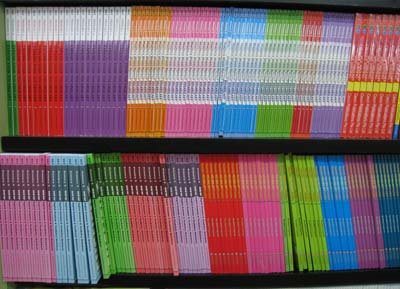The picture above is probably what you face every time you visit a bookstore to get assessment books for your child – towering shelves of different assessment books leaving you wondering: “Goodness me! How am I supposed to choose?” Of course, you can buy every single possible book available. But even if you don’t mind paying for all those books, it is highly likely that your child will faint when you reach home.
Here I just want to suggest 3 tips for parents who are clueless in terms of choosing the right assessment papers, especially for Maths and Science subjects.
1) Know your kids well.
Many parents claim to be aware of their children’s academic well-being. However, I must point out that different assessment books are targeted towards different groups of children. Some are basic practice questions to reinforce the child’s understanding of the basic concepts after lessons. These are useful when your child first starts on a topic. Other assessment books are for drilling on the different types of questions that are designed around each concept, and they can come in after your child knows the concepts well and needs repeated practice. Yet others are tough questions for advanced learners.
Knowing your kid’s standard and progress well will help you avoid buying the wrong assessment books for your kids and making them frustrated.
2) Buy books that are relevant.
There are two aspects of “relevance” being mentioned here. One, of course, is relevance to what the schools are teaching, and most assessment books claim that their questions follow the MOE curriculum. In this case, your child’s teachers and even private tutors can provide good recommendations.
The second “relevance” refers to the relevance to your child’s weaknesses when it comes to applying their knowledge. Well, we buy assessment books for our children because they are weak in certain areas and need practice to improve. Is your child weak at comprehension or grammar? Is he/she weak at memorising scientific facts or understanding why and how experiments are conducted? Take a detailed look at your kid’s test papers and compare questions which are based on the same topic, but from different sections of the paper.
3) Explanations for the answers are important.
Personally I like assessment books with detailed explanations. They help kids to understand the concepts and techniques, rather than simply memorising the answers. Encourage your kids to read the steps carefully and understand them – if possible, let them see the explanations only without the final answer. Immediately ask them to apply the concepts/techniques on similar questions to help them understand better. This helps give them greater confidence when facing similar questions in future.
Too Many Assessment Books?
I often hear parents complaining that their children cannot finish even 20% of the assessment books they have at home. To this I must reiterate: no single assessment book can satisfy all the learning needs of your child. Choose carefully and wisely, not only for the sake of your wallet, but also to lessen the burden on your child. After all, studying smart is far more important than spending hours on completing assessment books.
Tags: Lower Primary (7-10), Singapore, Upper Primary (10-12)
